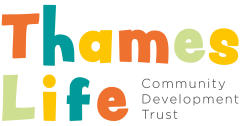Category: Blog
From Nurse to Community Organiser
I remember my brother screaming in A/E as he got stitches after falling into a wall in my Nan’s Garden. He was about 2 years old, and I was 4. I told my Dad, “No one I look after will scream like that.” That’s when I decided to become a nurse to help people get better.
My ambition to become a nurse never wavered. I researched the necessary subjects for my exams and visited the General Nursing Council careers office at Marble Arch when I was 14. I also wrote to the School of Nursing at Barking Hospital. The school careers officer was unhelpful and tried to discourage me. But nothing would. It was always my plan to care for people.
Since 1978, I have been employed in health care. I began my career at Barking Hospital on a geriatric ward as a Nursing Auxiliary while awaiting the commencement of my nurse training.
I began my 2-year training as a State Enrolled Nurse in 1979. I worked at Barking Hospital, Chadwell Heath, and King Georges. We were paid students and part of the workforce, rotating through 8-week placements on wards and departments like theatre or A/E, followed by a week in the classroom. We learnt on the job with shifts similar to qualified nurses, including late shifts, split shifts, and nights. I excelled during my placement in the Operating Theatre.
The Charge Nurse who mentored me had a big impact on my nursing career. As a student in the theatre, I scrubbed for major procedures under Tony Smythe’s guidance. I qualified in 1981, at a time when new nurses could choose their work area. One of my choices was the Operating Theatre, and in January 1981, I started working there at King George’s, Newbury Park. I stayed there for 18 months before I moved to the Isle of Wight.
I worked on the Isle of Wight for 19 years, returning to Barking in 2001 to look after my Dad after my Mum had passed away. During that period, I converted to a Registered General Nurse at Portsmouth University in 1996. I continued to work in theatres and achieved the position of senior staff nurse. Additionally, I was an officer in the Isle of Wight branch of the National Association of Theatre Nurses, which later became the Association of Peri-operative Theatre Practitioners. I served as membership secretary. I also held this role at the London Branch after relocating to Barking.
After returning to Barking, I worked as a junior sister in theatres at the Royal Free Hospital. I also assisted my Obstetrician and Gynaecologist friend with his hospital plans in Ghana. Later, I moved to Whipps Cross Hospital and became a senior sister in theatres.
In my early nursing career, I was married and had three daughters, leaving little time beyond motherhood and work. Despite this, I attended church and helped at a youth group in a local church hall until it closed.
Throughout my nursing career, I have consistently emphasized the importance of educating both nursing and medical staff to ensure patient safety and effective multidisciplinary team collaboration.
As part of my role in the National Association of Theatre Nurses (NATN) and as a senior staff nurse, I organized an educational evening in collaboration with a company specializing in medical devices. This event was the first of its kind on the Isle of Wight and provided certification for attendees, making it valuable for their personal development files. It was open to both surgeons and nurses and proved to be highly successful.
The Isle of Wight branch of NATN was very active; we organized open days where our operating theatre was accessible to the public and hosted a national event which invited nurses and speakers from across the country. During my tenure as an officer of the London Branch, various local events were arranged, and I frequently oversaw the catering. Consequently, I have gained extensive experience in catering for professional events.
As time went on, I became busier at Whipps Cross Hospital where I was a Senior Sister with the responsibility of 2 operating theatres, which led me to stand down from AFPP.
I identified a challenge due to the shortage of junior doctors available to assist during surgeries. With the assistance of the senior surgeon and considerable effort to persuade the theatre Matron and mangers, I pursued additional training to become a Surgical First Assistant. This qualification enabled me to expand my role as a scrub nurse and provide direct support to the surgeons. I received substantial support from my team throughout this process to achieve this certification.
I had a particular interest in DVT prevention, so I voluntarily attended a course offered by a medical company. The course was very informative. Equipped with the knowledge I had gained, I approached my manager, who initially didn’t give it much attention. However, after a CQC inspection of the hospital confirmed my concerns, it became urgent to address the issue promptly. Despite this, there was minimal education provided to the staff regarding the introduction of new procedures. I addressed this gap by arranging for a medical company representative to educate and inform the theatre staff, which significantly improved their understanding.
During the introduction of the Enhanced Recovery initiative at the hospital, I was sponsored by the Consultant Surgeon and Anaesthetist who launched the scheme to attend a workshop. I participated in this workshop on my own time. Unfortunately, there was minimal support from my manager and practice development nurse, possibly due to their lack of understanding of the concept. Nevertheless, I disseminated the information to the recovery nurses and anaesthetic nurses, as they were the professionals directly responsible for implementing the protocols aimed at improving patient recovery post-surgery.
I then served as the theatre department’s representative for various steering groups to improve patient outcomes, focused on continence, deep vein thrombus, and Enhanced Recovery. This role allowed me to become acquainted with different courses within the Trust that were available for my team to attend, thereby enhancing their practice and contributing to their professional development files (PDFs). I advocated for these courses to be accessible to theatre nurses. The nurses who attended found the courses both interesting and valuable.
Reflecting on my experience on the Isle of Wight, I undertook the task of educating surgeons and staff about specific medical devices used in certain procedures. With the support from medical company representatives and consultant surgeons at Whipps Cross, I organised a workshop for junior doctors on the usage of stapling devices. This initiative resulted in an engaging study day where junior doctors gained a deeper understanding of how these devices are operated. The primary rationale behind organising this event was to ensure patient safety.
These are just a few of the scenarios of my long nursing career in the operating theatre. But at the heart of it is always patient safety and education. When the rationale behind a process is explained, it tends to be better understood and more likely to be implemented.
I have always been passionate about supporting less fortunate areas overseas compared to the UK. I had the opportunity to fulfil that ambition through my friend, Davies, an Obstetrician and Gynaecologist from Ghana, who established his hospital in Accra, Ghana. I assisted him in acquiring equipment and resources for the hospital by attending medical auctions and collecting outdated yet functional equipment from Whipps Cross.
I was invited to Ghana several times to commission the operating theatre at Mary-Lucy Hospital and train nurses to become operating theatre nurses. On two occasions, I successfully procured a stack system free of charge from medical companies Styker and Storz for keyhole surgery. Additionally, I had the privilege of accompanying Davies to conduct free health clinics in his village located in the mountains of the Volta Region.
During these visits, I learnt to improvise when necessary and utilize basic nursing skills, which proved to be very rewarding. As a testament to my contributions, a ward in the second hospital that opened in Ofankor and an operating theatre in the new wing of Mary-Lucy Hospital have been named after me, which is a great honour.
My work in Ghana was acknowledged by Barts Health Trust. I was invited to speak at a convention of Trust employees who have contributed to health care overseas.
When I moved back to Barking to live with my Dad, who sadly died in 2004. I aimed to make new friends and learn about the area again. A note came through the door about the Sutton Tenants and Resident Association, which I began attending. Residents discussed various local topics, mainly bins and parking. Due to work commitments, I couldn’t attend as often as desired. However, it became clear that with direction and motivated people, several initiatives could be achieved, including a summer fete for charity on the green. I even won a cake competition and held a stall for St Patrick’s church. Eventually, when those key motivated individuals could no longer sustain the association, it folded. If it wasn’t for work commitments, I was considering taking a role myself, but as theatre sister it was impossible to predict if I would be home in time to attend meetings.
As I near the conclusion of my nursing career, I reflect on the extensive range of experiences I have gained. These experiences are now shaping the next phase of my life. I can now follow my ambition of supporting and helping my community. I believe I have much to contribute and share, which I intend to do within my local community. I am dedicated to environmental sustainability and committed to promoting the health and well-being of the community.
I am dedicated to my Christian faith and have embarked on a journey to contribute to the community in Barking. Since returning to Barking, I have been a member of St Patrick’s Church. I joined the Church Council in 2005 and assumed the role of secretary in 2010. As an active member of the Church, I have organized and facilitated many events that have welcomed the community into St Patrick’s Church. In 2023 I became Church Warden, under the direction of my senior warden, Linda I have learnt a lot about what it takes to run a Church.
The environment is of paramount importance to me, and in 2019, I sought ways to clean and learn more about the River Roding. Additionally, I was looking for assistance in cleaning up a river near my residence, as neither the council nor the Environment Agency appeared interested in addressing this issue. During my search, I was directed to Roding Rubbish, a litter-picking group, which facilitated my engagement with the community.
Through Roding Rubbish, I became acquainted with Steven Champion, the founder, along with Severine and Karen. Their efforts motivated me to organize clean-up initiatives in my local area, with substantial support from Severine, Karen, and other volunteers. My involvement with Roding Rubbish led to connections with the Thames Ward Community Project, where I attended a workshop at the Everyone Everyday Warehouse, a location previously unknown to me.
When Steven relocated to Manchester in 2022, I accepted his invitation to become Co-Leader alongside Severine. My first major independent project involved collaborating with TWCP, later rebranded as Thames-Life, to clean up The Ripple Nature Reserve. This experience was both enriching and educational.
I assumed the role of co-leader while working as a staff nurse in theatres. Prior to this, I had departed from Whipps Cross in 2015 and gained experience as an agency theatre nurse. During the COVID pandemic in 2020, I returned to Whipps Cross as a Staff Nurse.
On my days off, I participated in workshops and meetings that were instrumental in enhancing my skills and contributing to the development of Roding Rubbish. Additionally, I attended meetings focused on the re-opening of the Ripple Nature Reserve, an area I frequently I returned to Barking with my dog. It was renowned for its beauty and tranquillity. Moreover, I developed a keen interest in a planning forum. Some years earlier I had attended a resident engagement event at Christ Church on Thames View about the project on Barking Riverside. Little did I know then it was the start of a greater involvement in trying to subdue that development.
Matt, the CEO of Thames-Life, recommended applying for the Community Chest Fund, on behalf of Roding Rubbish This was a new experience. Severine was unable to assist due to her own commitments. Steven provided information about social prescribing. Through Roding rubbish litter picks, I connected with local councillors who taught me about social value. Skills developed during my nursing career, such as research and presentation, were utilized effectively. This was the first time applying for funding, and the presentation was prepared within a short period, receiving positive feedback. The application was successful, and the funding was obtained.
I became increasingly aware of my potential to contribute to the community. A position at Thames-Life became available for ‘Community Organiser’ for one day a week, which led me to reduce my hours at Whipps Cross and accept the new role. I continued participating in the Green-up group, focusing on litter picking and yoga. Inspired by the GP drop-in clinics, I decided to organize a similar clinic at St Patrick’s Church. With the assistance and guidance of Lucy from Thames-Life, Emma from the council, and the doctors from Ripple Road Surgery, the initiative was highly successful.
My experience in nursing has demonstrated that preparation and education are crucial in saving lives. I organized a Resilience Day for the local community. I collaborated with the British Red Cross, who provided instruction on first aid and basic life support. Additionally, I invited representatives from the local fire brigade, the environment agency, and other local authorities to speak at the event. Understanding that participants are more likely to remain engaged if refreshments are offered, I arranged for pizza to be served at the halfway point of the event.
I place high value on information dissemination within the community. There is significant news about events occurring in the borough and issues that require addressing or inquiry.
The Ripple Effect Resident Campaign group was established when residents were attempting to preserve the Everyone Everyday Warehouse, a valuable resource for the area where minimal rent was charged. Residents could acquire skills in woodworking, needlecraft, and podcast creation. However, the council mandated its closure, impacting many individuals’ mental health and their ability to find suitable alternatives. Unfortunately, the campaign to save the warehouse was unsuccessful.
Subsequently, the Ripple Effect Group relocated, and I assumed the role of Chair when the group moved to the local community club. This transition proved beneficial, as it engaged residents who previously showed no interest in their area. I have organized various guest speakers and consistently informed the group about developments within the borough to the best of my ability.
The experience, knowledge, and skills I have acquired throughout my nursing career, particularly in my roles as a Senior Sister and Team Leader, have equipped me with the confidence to apply them within the community setting. Reflecting on my training, I recall considering a role as a Community Nurse or practice nurse upon returning to Barking. However, the timing was not suitable for me then. I have decided that this now the right time for me to work in the community and retire from my main role as a theatre nurse. Now, I am eagerly anticipating the new challenges associated with the position of Health Outreach Organizer at Thames-Life.
By Marion Hull RGN.

New Sport England-Funded Initiative Aims to Boost Health and Wellbeing Across London and Manchester
Inclusive community project “Get, Set, Go!” launched by L&Q to deliver tailored fitness and movement programs for residentsLONDON & MANCHESTER — A new community-focused initiative funded by Sport England and spearheaded by housing association L&Q is set to bring inclusive sports, fitness, and wellbeing activities to neighbourhoods across London and Manchester. Titled “Get, Set, Go!”, the project will initially focus on engaging residents in and around Newham (Beckton and Royal Docks)Tower Hamlets (Oceans Estate, Stepney Green and Grand Union Place)Lambeth (Brixton Windrush and Brixton Rush Common)Barking & Dagenham (Academy Central RM8, Gascoigne Estate IG11, and Axe Street IG11)Manchester (Old Trafford and Broomwood). However, additional areas may be included over time based on community needs and emerging opportunities.The primary aim of the project is to improve the health and wellbeing of people of all ages by offering accessible, inclusive activities in local venues such as parks, leisure centres, schools, and community halls. Plans are also underway to establish a hub venue in each key area to anchor local engagement. A Holistic Approach to Community SupportBeyond physical health, Get, Set, Go! takes a broader, more holistic approach. Project lead Liana emphasised the importance of offering “added value” by integrating services that support mental health, education, employment, financial literacy, mentorship, and violence reduction, among others.”Residents will be the driving force behind this project,” said Liana. “We’re not just delivering physical activity and movement sessions—we’re building sustainable, community-led solutions that address real needs.” Collaboration at the Heart of the InitiativeL&Q’s newly appointed Community Development Leads (CDLs) will play a key role in the project’s success. These on-the-ground leaders will collaborate directly with residents, local volunteers, community organisations, and service providers to identify local priorities and co-create solutions. Using a place-based approach, CDLs will assess existing community assets and needs, forming strategic partnerships to deliver targeted interventions.The initiative will also integrate with L&Q’s wider support infrastructure, including Neighbourhood Housing Leads, the successful tenancies team, and employment support services. Call for Partners and Community VoicesLiana is actively calling on local partners, providers, schools, and youth groups to support both the consultation and delivery phases of the project.“We’re especially keen to hear from organisations that can offer activities aligned with the needs of younger residents and underrepresented groups,” she added. “If you’re a local provider with a passion for improving lives through sports and community engagement, we’d love to work with you.” For More Information or to Get InvolvedTo contribute to the consultation process or express interest in delivering activities, residents and organisations are encouraged to reach out directly to the project team directly via the following link or email for more information. Together, Get, Set, Go! hopes to lay the groundwork for stronger, healthier communities through inclusive, resident-led programming.
Inside Thames Life: The architect of social-wellbeing
As many of us do, I started the year with a resolution to give up terrible reality tv and hopefully spend more time reading. This meant cancelling my Netflix subscription and opting for a lighter dose of better-written tv through Disney+ and AppleTV+. Well, a friend recommended the show “Paradise” and if you haven’t watched it yet and don’t want a spoiler probably stop reading. I won’t spoil the storyline too much but it is set in an underground city full of people (chosen to be there), following a so-called doomsday event three years prior.
This blog is named after an episode where one of the characters talks through how she helped design the psychological aspects of the city, coining her role as “the architect of social wellbeing,” one about ensuring that the community don’t just survive but thrive there. It made me think about Barking Riverside. This new town, being designed around me, and I wondered whether the various planners and developers have been walking through similar thought processes. A desire to create a town that isn’t just for surviving but for thriving.
This will be my last written blog for a while in my capacity as Communications Lead, as I head off on maternity leave. As my young family grows once again, I can’t help but think about how living here makes me feel. I love walking around and knowing that I’m likely to see a familiar face. Living around people you know provides a feeling of safety and community. In my opinion, this isn’t the result of high-density living but a major effort of community organisations to bring people together, to spark dialogue between the diverse population and to bring fun to a place that can sometimes feel like a ghost town.
I also love having access to the River Thames. It makes such a difference walking along the shoreline and experiencing nature amongst the back drop of the development. Travelling on the Uberboat has also been an easy way for my family of four to get to Central London without the daunting tube stations and stairs. It’s meant lovely mornings, with a hot drink in hand, watching swans race against us, as my kids are mesmerised by their speed. A planning decision I applaud and am grateful for. However, there are many times where I wish I didn’t need to travel far to engage with interactive spaces.
Thinking of the future of my family and as the architect of social well-being for my own life, it’s important in deciding where one lives to think about what makes people thrive. For me, it’s the smell of freshly baked bread in the morning at a local bakery. It’s access to a hub of activity – a place for sport, art, culture that isn’t seasonal. It’s the Barking Food Forest, a community-gardening, resident-led space that has genuinely changed my lifestyle in allowing my family and so many others to get outdoors and enjoy nature every weekend. And ultimately, it’s living in a home built to last, with character and scope to grow, as our family grows.
Zainab Jalloh
Communications Lead
First Aid and Resilience Day
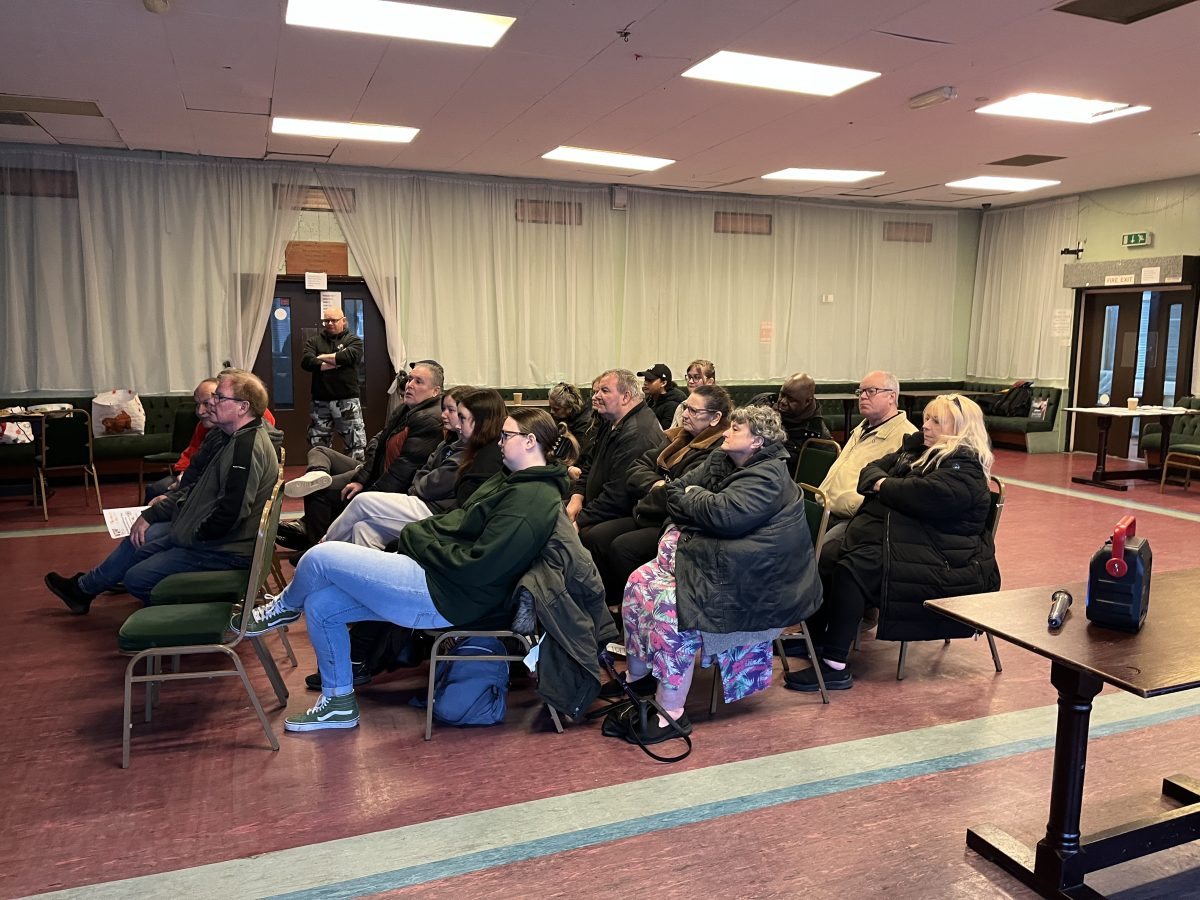
The idea for this event came to me after attending a talk at St. Patrick’s Church. Julie Taylor, who tragically lost her grandson to knife crime, was sharing her family’s experience and raising awareness by donating catastrophic bleed kits. Her message resonated with me—everyone should have basic knowledge of how to respond in an emergency.
With that thought in mind, I began discussions with members of the Ripple Effect Resident Group in the summer of 2024. Our initial focus was on securing a defibrillator for the Curzon Community Club. As the conversations evolved, it became clear that we needed to do more—we needed a First Aid course that would equip residents with lifesaving skills.
Thanks to ongoing discussions, we secured the installation of a defibrillator at the Curzon Club through the British Heart Foundation. But we didn’t stop there. The London Fire Brigade, after delivering an insightful session at another event, inspired the creation of a larger First Aid and Resilience Day. We invited them to speak, along with the Environment Agency, which provided guidance on flood preparedness. Additionally, Rev. Unesu from Christ Church joined us to share how the church supports the community in times of crisis—like during the Barking Riverside fire in 2019.
Around 40 people joined us, eager to learn and prepare for emergencies. The event kicked off with an engaging two-hour session from the Red Cross. Covering essential skills—how to respond to a collapse, heart attacks, choking, major bleeding, and the use of a defibrillator. Every participant walked away with new knowledge and a certificate recognizing their training.
After the session, we gathered for lunch, before diving into more discussions on resilience.
Post-lunch, the London Fire Brigade arrived—fire engine included! Darren, their team leader, delivered a talk on fire prevention and the importance of alarms. Attendees asked plenty of questions, eager to learn.
Next, the Environment Agency educated us on flood risks and early warning systems. Residents were encouraged to sign up for alerts and provided with a link to download the Environment Agency App—a small step that could make a huge difference in a crisis.
Our final speaker, Rev. Unesu from Christ Church, spoke passionately about the church’s vital role in emergency response. She shared how, after the devastating Barking Riverside fire, the church became a sanctuary—offering showers, washing machines, toilets, and hot meals to those in need. As a church that has served as a night shelter, Christ Church is well-equipped to support the community in times of crisis.
The feedback from attendees was overwhelmingly positive—many people expressed how valuable the day had been. Events like these not only equip us with lifesaving skills but also bring us together as a community, reinforcing the importance of being prepared.
With such a strong response, I hope to organise more events in the future, continuing to build a resilient, informed, and empowered community.
Would you be interested in attending a future session? Let’s keep the conversation going and make our neighbourhoods safer for everyone.
Marion Hull
Community Organiser
Finding Home in Barking Riverside: Richard’s Journey Through High-Density Living
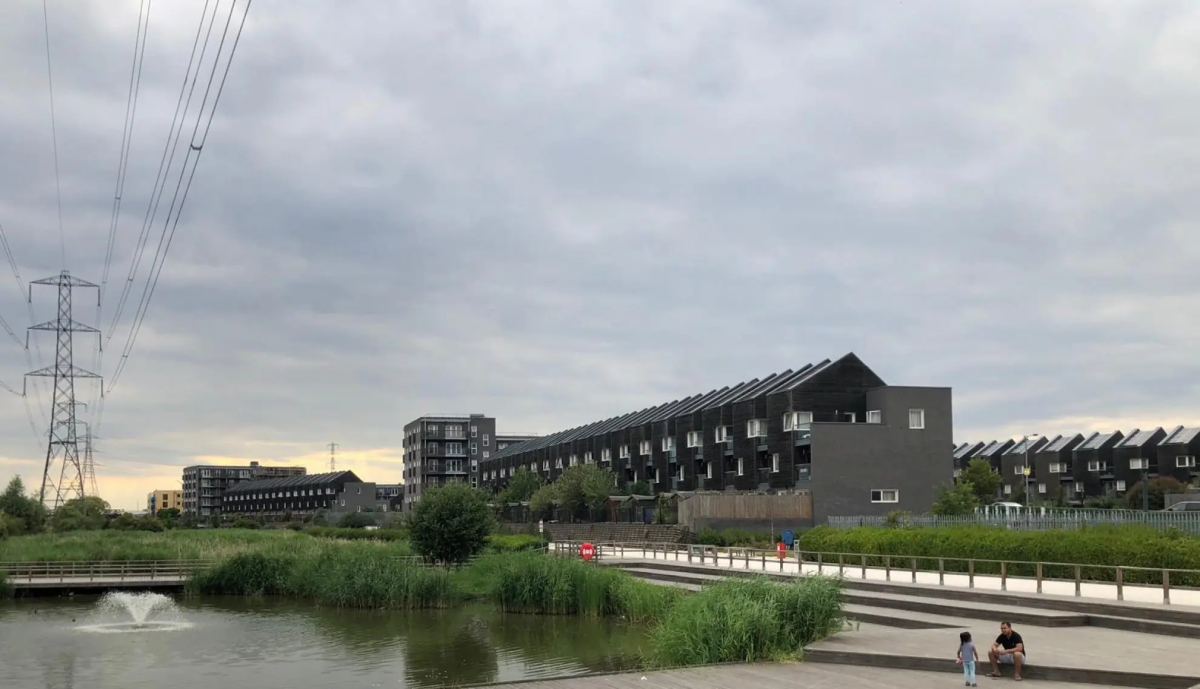
Inside Thames Life: Championing change, together
Thanks to the residents and fellow workforces of Barking and Dagenham, I’ve had two years of passionate enrichment. I’ve heard hundreds of stories and been deeply touched by the love and kindness of those I have worked with. I’ve been amazed by the resilience and compassion people have for each other, despite living in such a deprived and unfair society and been met with absolute enthusiasm and passion for positive change by the youngest of minds.
It isn’t easy living here. We long for provision! We as people of this borough are pleading for just enough to ensure our community survives because we know with just a few changes, we will thrive. Fresh faces and maverick ideas with genuine hearts will bring us forward and advance the borough into the ever-changing future. It really is time for better standards, better ethics and love.
Thank you to my family, friends and colleagues and most of all thank you to all the residents who have trusted and supported me throughout my time in this role. I’m not going far so you can bet you’ll see me around in and amongst the fabric of our wonderful community.
Lucy Lee
Health Outreach Officer
Housing keeps me up at night
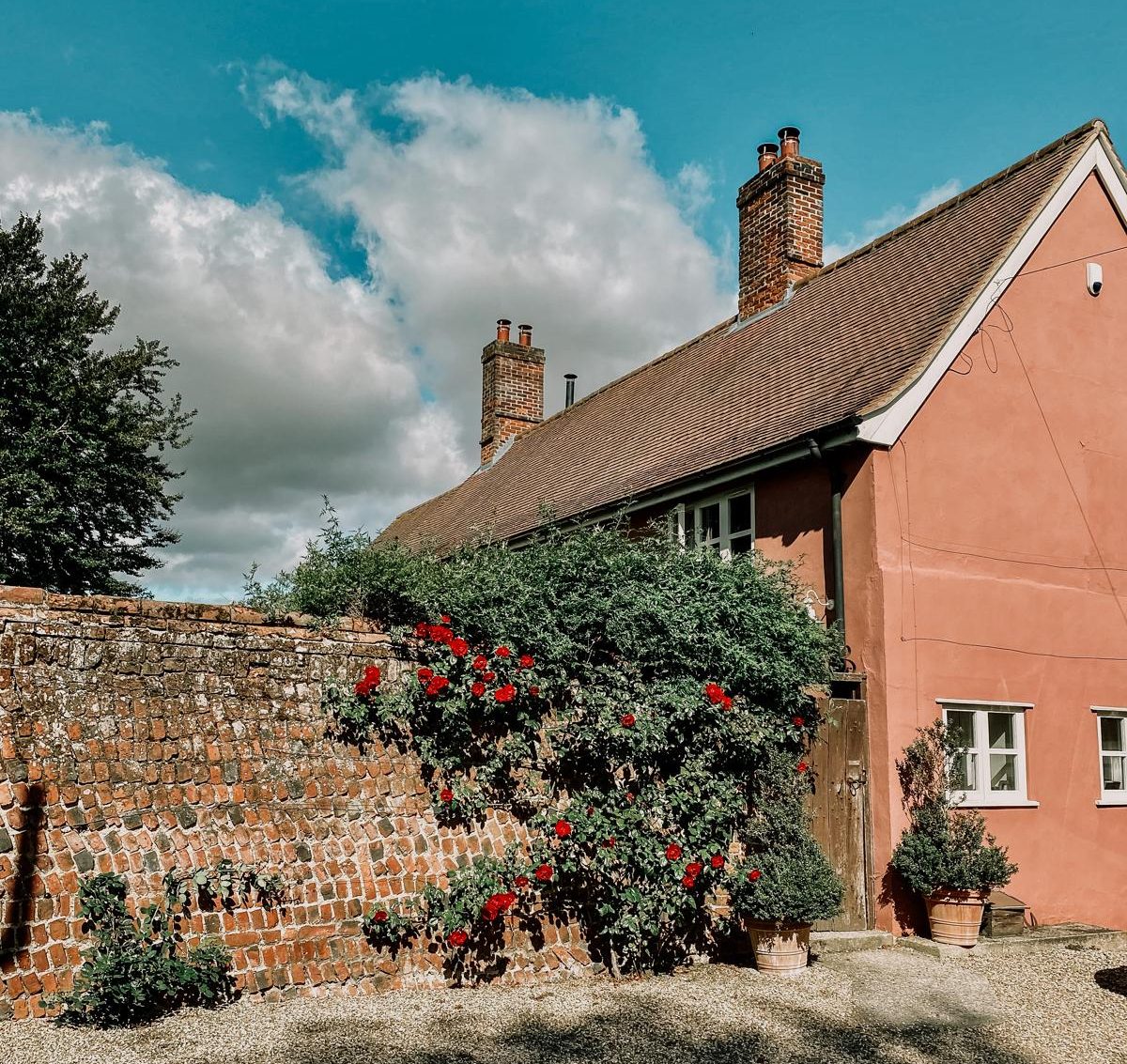
I wouldn’t want to exaggerate the matter but I have in recent times found myself thinking a lot about my housing situation and the current environment a generation of people like me find ourselves in. I’m a millennial and the reality is hitting home that I am part of a generation who is not only poorer than our parents but it’s also highly probable that I won’t be able to buy my own home. Definitely not in London anyway. My only option for home ownership in London is the notorious shared ownership housing scheme, which will never work for me because in my opinion leasehold will never truly be ownership, never mind the soaring costs.
So, what does a young family of four like mine do? We rent privately for the time being, save up as much as we can, manage small investments and aspire for a life away from profit driven housing developments, to spaces where a real home with uniqueness and character can be ours for generations. It’s funny how that increasingly sounds like a fairy-tale but I’m optimistic. Unfortunately, for housing developments like the one I live on currently, increased density isn’t part of my wish list.
There are a few personal and key reasons why. Starting with money. For investors more housing units would be attractive. The land is lucrative; charges increase and housing becomes more expensive, making the rich richer. However, for many of us the housing will become unaffordable, forcing us to sever our local ties and be pushed further out of London.
Secondly, density without fit-for-purpose community spaces and basic amenities never did breed social cohesion and a safe community. If our reality is living in boxes, it’s absolutely vital that we have spaces to enjoy nature, to gather, to be creative. On a basic level though, it’s about being able to complete the weekly grocery shop at an affordable supermarket without having to jump on a bus or get on a train with all the shopping. I would challenge any housing planner to do that with kids in tow.
Further, the fact that just a few years ago we experienced a global pandemic, it is baffling to me that health is not at the forefront of planning. Increased density without a health facility means in real terms that when I call my health provider at 8am instead of being 50th in the queue, I won’t get through to anyone.
I could go on but I really want to end on a lighter note. Housing really is a nightmare affecting local people but I want to share an actual dream I had. I had a dream that Barking Riverside was filled with pockets of houses surrounded by greenery and the serene of the River Thames. In the dream, I walked through one of the houses, it was terracotta, a space built with thoughtful materials, lots of natural light and exquisite furniture. The climax though was asking the agent the price to buy and the response made me realise I was in fact dreaming. That may have been the case in this instance but maybe we start with a dream to realise the possibility, maybe here change is gonna come.
Zainab
Communications & Outreach Officer
Inside Thames Life: Meet Narash, our newest team member!
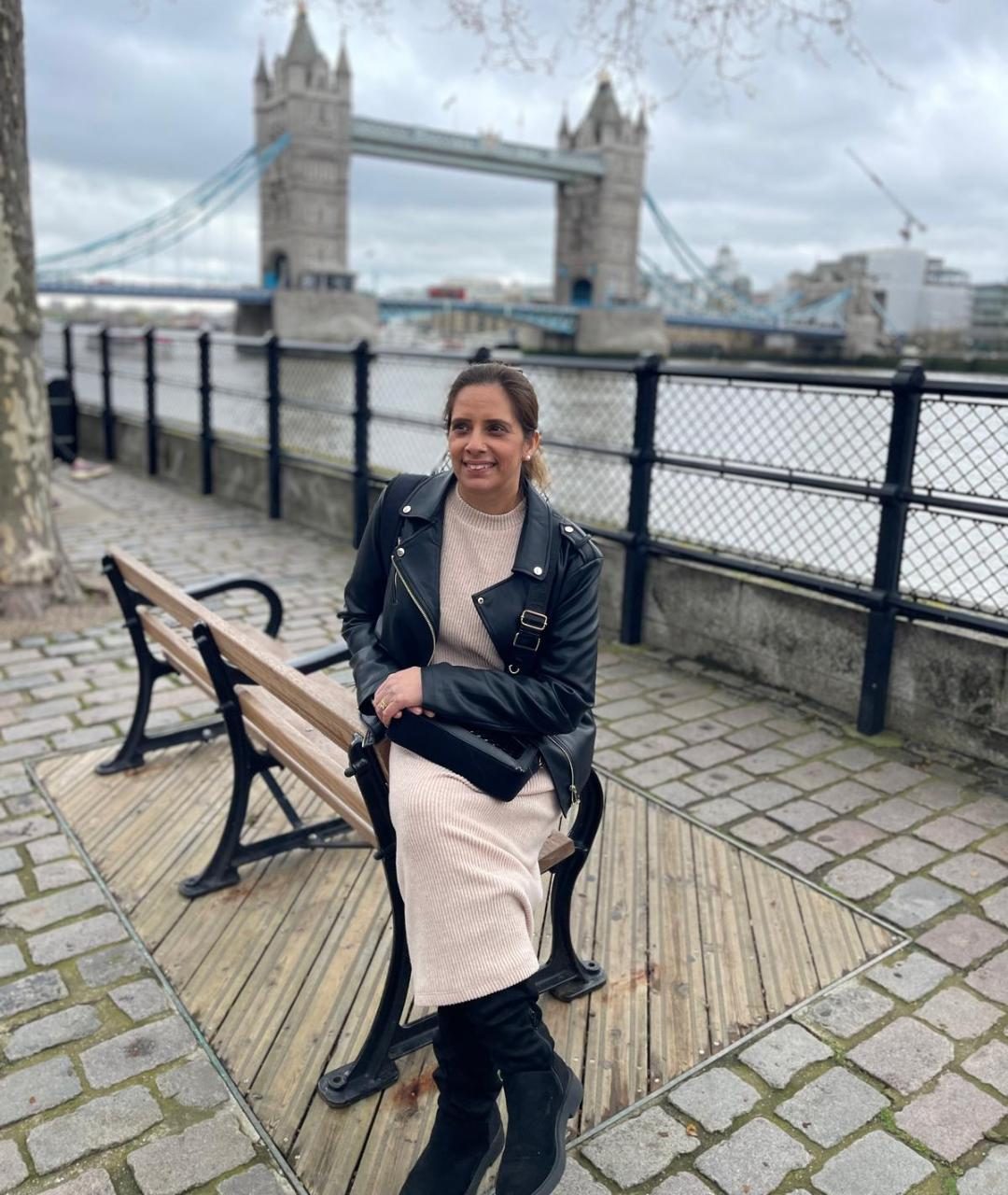
From East London to Freelancing: My Journey of Growth, Learning, and Communication
Hello! My name is Narash, and I’m thrilled to share a little bit about myself, my passions, and the values that shape who I am today. Curiosity has always been at the heart of who I am, fuelling my passion for learning and discovery. Born and raised in East London, I have cherished my roots, embracing a rich tapestry of culture, diversity, and vibrant life experiences. As a family-oriented person, I find immense joy in nurturing meaningful connections that transcend boundaries.
A Career Built on Communication and Coordination
My professional journey has been diverse, starting with a career in banking, where I learned the importance of structure and precision. But my true passion lies in bringing people together and facilitating communication. I currently freelance as an Administration & Coordination Project Manager at Thames Life, where I help streamline processes, manage projects, and ensure that things run smoothly.
What I love most about my work is the power of communication. It’s amazing how investing time and effort into effective communication can help break down barriers—especially for those whose first language isn’t English. I’m passionate about helping people connect, whether in the workplace, within a community, or through collaborative efforts. Being part of a community is something I truly value. I understand the importance of belonging and the positive impact it can have on individuals and society as a whole.
A Family-Oriented Foundation
Family has always been at the heart of everything I do. Growing up, my family played a pivotal role in shaping who I am today. It’s this foundation that inspired me to help set up our family business, and it continues to motivate me in everything I do, especially in my career. I’m married with three children, and I’m blessed to have them in my life, keeping me grounded and motivated to give my very best every day. Becoming a mum was the most rewarding and defining moment of my life, and I strive to be a positive role model for my children—showing them the importance of hard work, integrity, and following their dreams. When I’m not working, you’ll likely find me enjoying long walks or heading out to try a new restaurant with my family.
A Love for Eastern and Western Cultures
One of the things that excites me most is the fusion of Eastern and Western cultures. From the music I listen to, which blends both worlds, to the food I enjoy, I’m fascinated by how the best of both sides come together to create something unique. I also love exploring how fashion, food, and traditions from both sides of the world can mix to form something exciting and new.
Goals and Aspirations
Looking ahead, my goals are simple yet meaningful: to continue growing, both personally and professionally, and to build a brand for myself that reflects my values of honesty, communication, and community. Every step I take is towards creating something that I can be proud of and that will benefit both myself and those around me.
Thank you for taking the time to read a little about my journey. I hope you find something here that resonates with you, and I look forward to sharing more as I continue to grow, learn, and bring people together.
Narash
Administration & Coordination Project Manager
Inside Thames Life: Barking Riverside and Thames View Community Plan
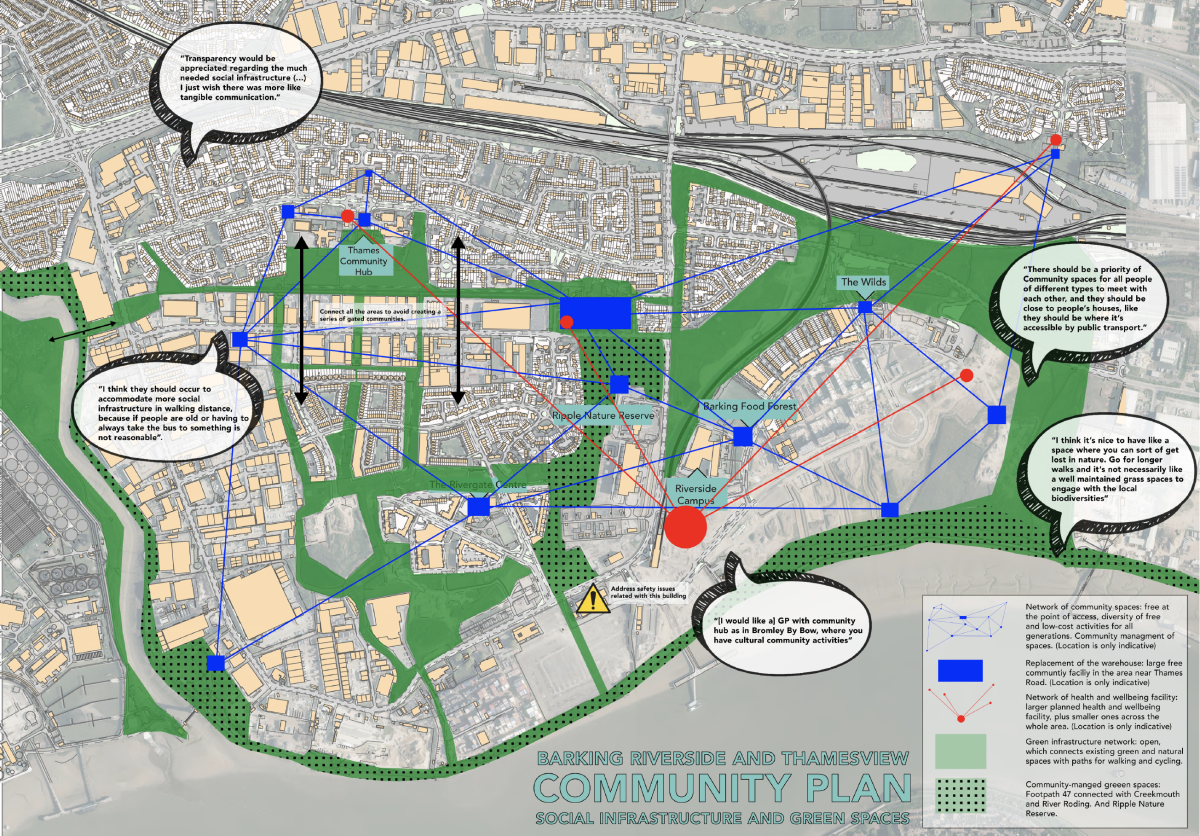
Thames Life is pleased to present a report which has been collaboratively produced with Dr. Pablo Sendra’s team at the UCL School of Bartlett. The report is a community plan which was crafted in a series of workshops with residents from Thames View and Barking Riverside. The report details findings in which residents were placed at the center of co-designing how social infrastructure should be constructed in Barking Riverside to meet demand. The densification of Barking Riverside, planning application for additional homes rising to 20,000 and the additional 5000 homes in Thames Road, according to the views of a significant sample size of residents, requires the creation of further social infrastructure.
Social infrastructure reigns in on a variety of different elements that enable the practical participation of local people in organised or disorganised spaces of activity. Put simply, if residents want to meet informally to socialise, express or interact with each other based on cultural values, or for the purposes of human, face to face interaction, these spaces must be ‘planned for’ to allow these interactions the physical space to take place. In complementary fashion, social spaces which are more formal such as nurseries, play parks, health facilities (which allow for social prescribing and activities), locations for sports, youth centers, arts, culture and performance spaces and lastly, community centers. Green, and blue spaces also operate to serve resident need for ecology, as community allotments. Creekmouth open space, the Barking Food Forest, Ripple Nature Reserve, Ripple Greenway and Footpath 47 begin to serve as crucial spaces in the natural environment for the needs of local people.
The report, diligently produced by UCL in collaboration with residents engaged with through Thames Life contains the granular details of opening the wider picture in the midst of London developments promoted by the GLA such as opportunities areas, and resident views correlated with the Local and London Plans. The audit of pre-existing social infrastructure highlights what is missing, and what needs to be done to make up for the shortfall.
Thames Life embarked on this venture with UCL while the Every One Every Day Warehouse was still open, with the original intention to keep it open with this community plan. As we discovered – this was not possible. The community plan changed shape and became what is published today. We Thank UCL and the Bartlett School of Planning and the Just Space network in considering our small patch of London, and the future of residents living here.
Vishal Narayan, Community Organiser and Regeneration Officer.
To read the report, click on the link: https://discovery.ucl.ac.uk/id/eprint/10193733/
